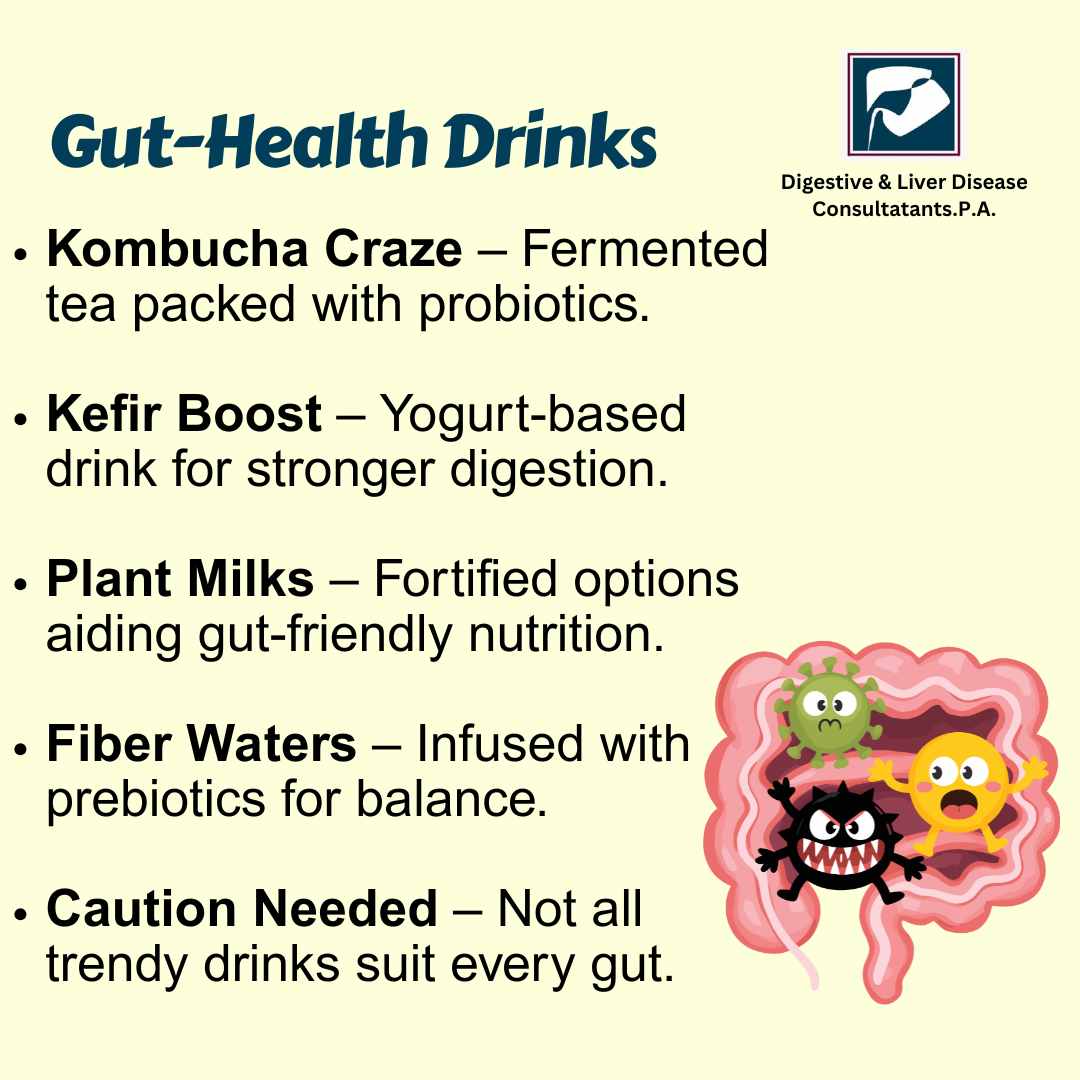Gut health has become one of the most talked-about wellness topics in recent years. From social media trends to grocery store shelves, functional drinks are everywhere, promising to support digestion, balance gut bacteria, and improve overall well-being. But with so many options, it can be confusing to know what really works and how these beverages can benefit your digestive system.
Why Gut Health Matters
Your gut plays a critical role in your overall health. It does more than digest food; it also helps absorb nutrients, supports your immune system, and communicates with your brain through the gut-brain axis. An unhealthy gut can lead to problems like bloating, constipation, diarrhea, fatigue, and even mood changes. That’s why people are turning to functional foods and drinks that promise to support digestive wellness.
What Are Functional Drinks?
Functional drinks are beverages that provide benefits beyond basic nutrition. Unlike regular sodas or juices, these drinks are made with added ingredients like probiotics, prebiotics, vitamins, minerals, and herbs that are designed to improve specific aspects of health. For gut health, the most common ingredients include live probiotics, fiber, and plant-based compounds that support the balance of gut bacteria.

Popular Functional Drinks for Gut Health
1. Kombucha
Kombucha is a fermented tea made by adding a culture of bacteria and yeast to sweetened tea. During fermentation, it produces probiotics, antioxidants, and a slightly tangy flavor. Many people drink kombucha to promote better digestion and support a healthy gut microbiome. However, not all kombucha brands contain live cultures, so it’s important to read labels carefully.
2. Probiotic Yogurt Drinks
Yogurt has long been a staple for gut health, but drinkable yogurts have become a convenient option. These beverages are packed with probiotics like Lactobacillus and Bifidobacterium, which are known to improve digestion and support immune function. Choosing unsweetened or low-sugar varieties is best for long-term gut health.
3. Kefir
Kefir is a fermented milk drink that contains a wider variety of probiotics compared to yogurt. It is slightly tangy, creamy, and rich in beneficial bacteria and yeast. Some studies suggest kefir may help reduce bloating, improve lactose digestion, and boost gut diversity. For those who are lactose intolerant, there are non-dairy kefir options made from coconut, almond, or oat milk.
4. Prebiotic Fiber Drinks
While probiotics add good bacteria to your gut, prebiotics feed the beneficial bacteria already present. Prebiotic drinks are often infused with fibers such as inulin, chicory root, or resistant starch. These fibers can help regulate bowel movements and improve gut balance. However, consuming too much fiber at once may cause gas or bloating, so it’s best to start slowly.
5. Apple Cider Vinegar Drinks
Apple cider vinegar (ACV) has gained attention for its potential digestive benefits. Diluted ACV drinks are believed to help with digestion, regulate blood sugar, and support gut bacteria. While more research is needed, many people enjoy these drinks as a refreshing, tangy option. Always remember to choose diluted or ready-to-drink ACV beverages to protect your teeth and stomach lining.
6. Herbal Teas
Certain herbal teas like peppermint, ginger, and chamomile are known for their soothing effects on the digestive system. Peppermint tea may ease bloating and indigestion, ginger tea can help with nausea, and chamomile tea promotes relaxation, which indirectly supports digestion.
7. Plant-Based Probiotic Drinks
With the rise of plant-based diets, many companies now produce probiotic beverages using non-dairy bases like oats, soy, or coconut. These options provide similar gut-friendly bacteria as traditional dairy drinks, making them a good choice for people who are vegan or lactose intolerant.
Are Functional Drinks Really Effective?
While functional drinks can support digestive health, they are not magic solutions. Their effectiveness depends on factors like the type and number of probiotics, how the drinks are processed, and your individual gut microbiome. Some drinks may contain added sugars or artificial ingredients that can counteract their benefits. It’s important to choose products with live cultures, natural ingredients, and minimal added sugar.
Additionally, gut health relies on overall lifestyle choices, including a balanced diet, adequate sleep, regular exercise, and stress management. Functional drinks can be part of the picture, but they should not replace a healthy lifestyle.
Tips for Choosing the Right Gut-Health Drinks
- Read the labels: Look for drinks with live cultures and minimal added sugar.
- Start small: Introduce new drinks gradually to see how your body responds.
- Check for quality: Choose reputable brands that prioritize safety and scientific backing.
- Match to your needs: For example, if you are lactose intolerant, opt for plant-based probiotic drinks.
- Consult your doctor: If you have digestive issues, it’s best to get professional advice before trying new supplements or functional drinks.
Gut Health and Digestive & Liver Disease Consultants, P.A.
At Digestive & Liver Disease Consultants, P.A., we understand how important gut health is to your overall well-being. Our team of highly experienced gastroenterologists provides advanced care for conditions such as irritable bowel syndrome (IBS), inflammatory bowel disease (IBD), acid reflux, liver disease, and many other digestive disorders.
We take a personalized approach to treatment, helping patients make informed choices about their diet, lifestyle, and medical care. Whether you are curious about gut-health drinks, struggling with chronic digestive issues, or simply want to improve your digestive wellness, we are here to guide you every step of the way.
Conclusion
Functional drinks are more than just a trend — they can play a meaningful role in supporting digestive health. Beverages like kombucha, kefir, yogurt drinks, prebiotic fiber drinks, and herbal teas may help improve gut balance, reduce digestive discomfort, and support your overall health.
However, not all drinks are created equal, and results vary from person to person. Making smart choices, paying attention to ingredients, and consulting with a specialist can help you find what works best for your body.
If you are experiencing ongoing digestive issues, bloating, or discomfort, don’t ignore the signs. The specialists at Digestive & Liver Disease Consultants, P.A. are here to help you take charge of your digestive health with expert guidance and personalized treatment.
Schedule an appointment today and let us help you feel your best.






